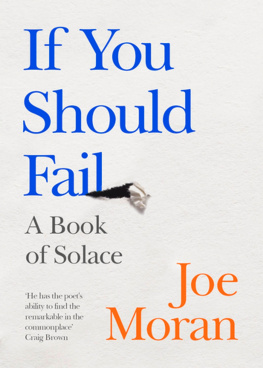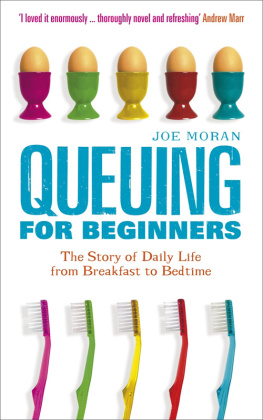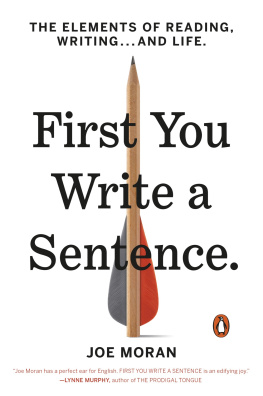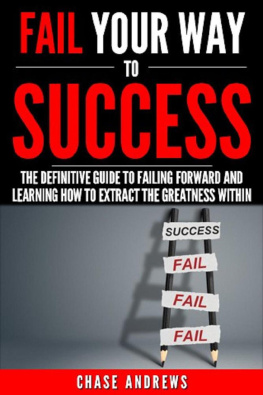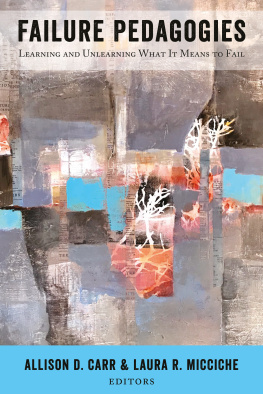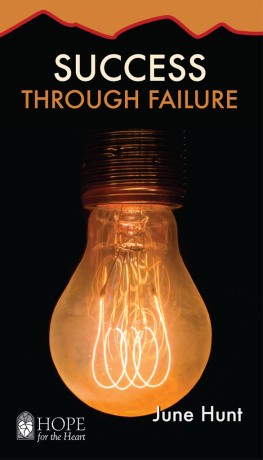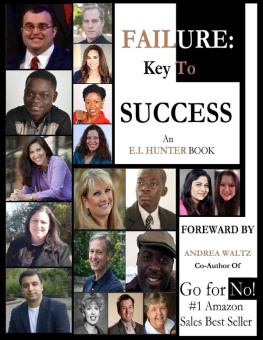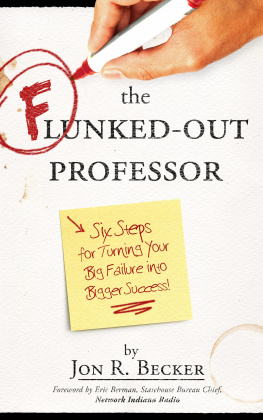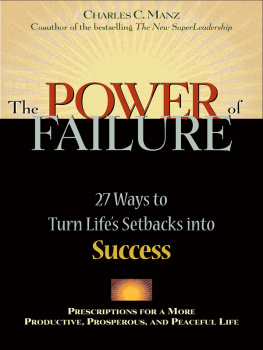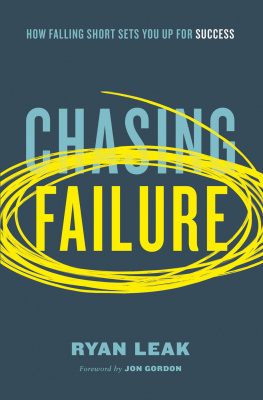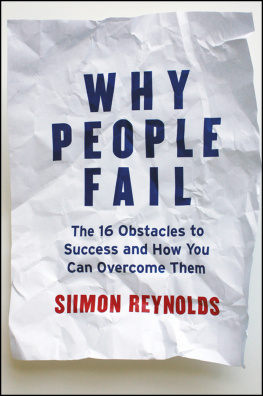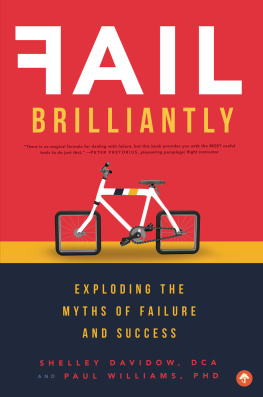
Joe Moran
IF YOU SHOULD FAIL
A Book of Solace

Contents
- 1. Despair Young and Never Look Back
, Or why failure is not a lesson - 2. Not Enough, Not Enough
, Or why you feel like an impostor - 3. The Examination Dream
, Or how we are schooled to feel like failures - 4. Life Is Hell, But at Least There Are Prizes
, Or why rewards are never worth it - 5. None of Us Is Proust
, Or how creative failure is like life - 6. The Crooked Timber of Humanity
, Or why failure is only human - 7. The Republic of Failure
, Or why failure feels like coming home
About the Author
Joe Moran is Professor of English and Cultural History at Liverpool John Moores University and is the author of eight books, including Queuing for Beginners: The Story of Daily Life from Breakfast to Bedtime, Armchair Nation: An Intimate History of Britain in Front of the TV, Shrinking Violets: The Secret Life of Shyness and First You Write a Sentence. He writes for, among others, the Guardian, the New Statesman and the Times Literary Supplement.
For Jo

1.
Despair Young and Never Look Back
Or why failure is not a lesson
All through that winter he was there. Every morning, as soon as I entered my office, I looked out of the window to check. A young rough sleeper had camped in an unused doorway of the hotel across the street from my university building although camped rather oversells the nature of his sleeping arrangements.
He could hardly have alighted on a less suitable spot to lay his head. The doorstep on which he slept was about half the width of a childs single bed and about two-thirds the length of his body, which meant that he had to twist his spine to stay on it. The doorway had no porch, so his only defence against the elements was his sleeping bag. When it was cold and wet he just tried to sleep on, getting colder and wetter. Around ten, he wriggled out of his bag and, still dressed in his dirty combats and parka, stood up and shook himself down. Sometimes a kindly waiter fetched him some cold toast left over from the hotel breakfast, and he sat there munching it, slowly and sadly.
I work in an urban university, a former polytechnic made up of buildings acquired ad hoc and scattered around the centre of an English maritime city. There is no cloistered quadrangle here, hidden behind stone walls and a porters lodge not even a discrete campus. We are parked in the middle of the citys problems. Leaving work late one evening I found a man, half-sleeping and half-moaning, in the vestibule entrance. The leavings of other rough sleepers cheap bivouacs, damp duvets, empty bottles litter the route from my building to the car park. From my office I hear shouts in the street, people wailing bewilderedly at the world.
You learn to tune them out. Like most people, I deploy an efficient mental filter system to shut out the lives of others and, as the Chinese saying goes, watch the fire burn from the other side of the river. But this young man had somehow filtered through. My office window just happened to be directly above and opposite the doorway where, of all the square feet of spare pavement in this city, he had chosen to sleep. We seemed linked by the accident of sight lines, even though he never once looked up at me. Each morning he played out this little urban parable for my benefit, as if his life were an Italian neorealist film and my window a cinema screen.
When not asleep, he was usually reading a book, although he was too far away for me to see what book it was. He would spend hours reading it before disappearing somewhere, leaving his sleeping bag and belongings behind. The next morning, when I entered my office, there he was again.
It shouldnt have made any difference. But for me that book fleshed him out, and made him seem more like one of the students I teach. It struck me that all he needed to turn him into one of them was an ID card with a barcode that would buzz him into the building. With one of those small oblong bits of PVC, bestowed when entry requirements are met and tuition fees paid, he could have entered the friendly functionalism of the classrooms, the calm of the library and the convivial hum of the cafe. He could have joined one of my classes and shared his thoughts about that dog-eared paperback in his hands. Instead he was out in the cold and wet of a northern English winter.
My own ID card fits in a plastic holder, attached to a braided lanyard worn around my neck. This is the magic entry ticket that, with a quick wrist-flick at the entrance scanner by the doors, turns me into persona grata. It lets me into a building where I have my own office, my own mug on a shelf in the staff kitchen, a pigeonhole with my name typed and stuck on with sticky tape, and people who know me and rely on me to show up. Getting through that door is my first and sometimes only success of the day. It tells me that I am a fit and proper person to enter a building that I am not, on this rudimentary level, a failure.
Still, I know I am just another payroll number. Were I to displease my employer once too often, my lanyard would be seized and I would be out on the street, never again to hear that cheering open-sesame buzz. Watching that rough sleeper, it struck me how flimsy is the carapace of competence that makes us feel like paid-up members of the human race. I kept thinking of the first line of a Dana Spiotta novel: It is easy for a life to become unblessed.
These young homeless people have multiplied on Britains streets in recent years: human-shaped heaps of blankets, walled in by rucksacks, plastic carriers and cardboard layers. You find them in the covered entrances to supermarkets, the stairwells of car parks, the alcoved windows of department stores. Recently I passed an art exhibition on homelessness in the foyer of our university library. One exhibit was a single sheet of corrugated cardboard sculpted into the shape of a hooded man hunched foetally on the floor. No caption was provided, or needed.
Often its hard to work out if there is a body inside them, these little mounds of rootless humanity. Sometimes you see a head half-poking out of the mound, asleep or with a lost, vacant look. Sometimes you dont, because the human occupant has absented themselves. The odd passer-by does a double take, briefly wondering if anyone is in there. Most walk by without a sideways glance. We all struggle to reinsert a whole person into that shape: someone with a name, a family, a life history that led them here and a body just as achy and sore as yours would be if your mattress were a pavement, your roof the open sky and your only shelter the lintel of a door that never opens for you.
A month or so after that young man started bedding down in that hotel doorway, another rough sleeper, a Hungarian called Gyula Remes, collapsed and died in central London. Homeless EU nationals rarely sought help to get off the streets because government policy, until the High Court ruled it illegal, had been to deport them. At forty-three, Remes had died a year short of the mean age at death of a homeless person in England. He was the second man in a year to die in the underpass leading from Westminster tube station to the Houses of Parliament, a spot where homeless people would gather until, a few months after his death, rolldown shutters were installed and drove them out.
Next page
